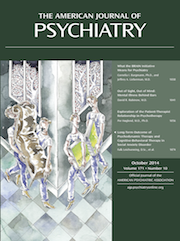Sequential Treatment With Fluoxetine and Relapse-Prevention CBT to Improve Outcomes in Pediatric Depression
Abstract
Objective
The authors evaluated a sequential treatment strategy of fluoxetine and relapse-prevention cognitive-behavioral therapy (CBT) to determine effects on remission and relapse in youths with major depressive disorder.
Method
Youths 8–17 years of age with major depression were treated openly with fluoxetine for 6 weeks. Those with an adequate response (defined as a reduction of 50% or more on the Children’s Depression Rating Scale–Revised [CDRS-R]) were randomly assigned to receive continued medication management alone or continued medication management plus CBT for an additional 6 months. The CBT was modified to address residual symptoms and was supplemented by well-being therapy. Primary outcome measures were time to remission (with remission defined as a CDRS-R score of 28 or less) and rate of relapse (with relapse defined as either a CDRS-R score of 40 or more with a history of 2 weeks of symptom worsening, or clinical deterioration).
Results
Of the 200 participants enrolled in acute-phase treatment, 144 were assigned to continuation treatment with medication management alone (N=69) or medication management plus CBT (N=75). During the 30-week continuation treatment period, time to remission did not differ significantly between treatment groups (hazard ratio=1.26, 95% CI=0.87, 1.82). However, the medication management plus CBT group had a significantly lower risk of relapse than the medication management only group (hazard ratio=0.31, 95% CI=0.13, 0.75). The estimated probability of relapse by week 30 was lower with medication management plus CBT than with medication management only (9% compared with 26.5%).
Conclusions
Continuation-phase relapse-prevention CBT was effective in reducing the risk of relapse but not in accelerating time to remission in children and adolescents with major depressive disorder.



